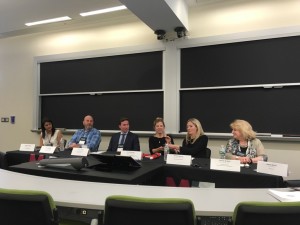 Admissions consultants from around the world met with admissions directors from most of the top schools at the 9th AIGAC conference at MIT. Held at MIT (June 14-15) with visits to Tuck (June 13), HBS (June 16), and Babson and Fletcher (June 17), the conference was an enriching experience. The MIT Panel discussions on the first day provided valuable insights into various offerings by the school. On the second day, representatives from more than 20 business schools attended the conference and shared their insights on admission trends, challenges, and client expectations/ questions.
Admissions consultants from around the world met with admissions directors from most of the top schools at the 9th AIGAC conference at MIT. Held at MIT (June 14-15) with visits to Tuck (June 13), HBS (June 16), and Babson and Fletcher (June 17), the conference was an enriching experience. The MIT Panel discussions on the first day provided valuable insights into various offerings by the school. On the second day, representatives from more than 20 business schools attended the conference and shared their insights on admission trends, challenges, and client expectations/ questions.
Below are highlights of the panel discussions on common questions from applicants. The panelists were from Darden, Stern, Rotman, Haas, Yale SOM, and Owen.
 Question #1: Do you prefer GRE or GMAT?
Question #1: Do you prefer GRE or GMAT?
Almost all the panelists said that they don’t have a preference; they accept both GRE and GMAT. Here are some additional insights:
- Yale- Some candidates do better on GMAT while some do better on the GRE, so it is up to the candidates to choose either of the tests.
- Rotman- We don’t have a preference for GMAT or GRE, but some recruiters may prefer one over the other.
- Owen- We prefer GMAT, and we expect the quant part of GRE to be very high.
Question #2: What is your preference for other English language tests?
All the school representatives were in agreement that they accept all English language tests.
Question #3: What do you think about GMAT retakes?
All the schools emphasized that they like to see them applying with good scores. Some additional insights were:
- Darden- We don’t see people improving after retaking tests more than three times. We don’t think they are perfectionists; we rather feel that they are obsessed with their score.
- Owen- If they send us a score they got the first time and it’s not very good, we think they are not taking initiatives.
Question #4: How do you value IR scores?
All the school reps admitted that the schools are still trying to figure how much weight they should be giving to IR.
Questions #5: Do you think the applicants with low GPA or GMAT should take extra courses from a community college or from a reputed university?
Most school reps agreed that the bigger concept is to take initiative so they are better prepared.
- Darden– We want to see that they are taking initiative. Taking Coursera course is a great way to show their intuitive.
- Rotman– Taking community college courses definitely shows that they are taking initiative.
- Stern- We recommend that they simply retake the GMAT because that is the most rigorous tool.
Question #6: What is too old or too young for MBA program?
There was a consensus that they do accept older candidates if their story appeals to the admission team. Some additional insights were:
- Rotman- We recommend two years of work experience. But we don’t have maximum or minimum. We try to identify the applicants’ fit with the program.
- Darden- The average age of the admitted students is 22-27, but we still don’t consider age as a bar, and we do accept older candidates if they demonstrate their ‘fit’ with the school.
- Yale- There is no minimum age for admission. It depends on their story; their story has to make sense. Military candidates are generally older, but they bring maturity and perspective to the classroom.
- Haas- There is no maximum age for MBA program. We have students with as many as 15 years of work experience. Some candidates are from regions where they have more experience. Some students take longer in finishing their studies.
Question #7: How do you approach the waitlisted candidates?
- Darden- We have waitlist counselors who give them detailed feedback.
- Owen-We also give them specific feedback. If they do what we tell them to do, their chances are good.
- Yale- All waitlisted applicants are qualified to be in. At Yale, we follow up and ask them if they are still interested.
- Rotman– We waitlist some candidates because we feel confident about them. If their GMAT is not competitive, they should retake it and submit the new test scores.
- Stern- We don’t give feedback at all. We expect the candidates to figure out themselves. It is evident that the waitlisted candidates are not as strong as other candidates. If their GMAT is not competitive, they should give another shot at GMAT.
Question #8: Do you have any advice on rankings?
Darden- Rankings are a good place to start. We care about rankings. However, sometimes candidates get too wrapped up in rankings and don’t see the other aspects.
- Stern- I think they should look beyond numbers. Sometimes the perception of these schools may be different.
- Rotman- The rankings need to be viewed in reference to each candidate’s stats. The rankings can provide some value, but other factors also need to be factored in.
Overall, the panel discussions with the representatives from the top schools on ‘All Schools Day’ at the MIT on June 15 provided extremely valuable insights on the common questions that the applicants usually ask me.
Click here for school reps’ insights on career services.
This post was first published in myessayreview blog
For more questions, email me at poonam@myessayreveiw.com
